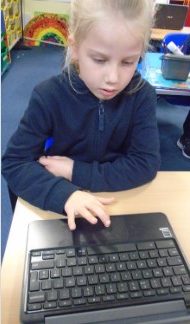Computing



Computing at Stephen Freeman Primary School intends to develop ‘thinkers of the future’ through a modern, ambitious and relevant education in computing. We want to equip pupils to use computational thinking and creativity that will enable them to become active participants in the digital world. It is important to us that the children understand how to use the ever-changing technology to express themselves, as tools for learning and as a means to drive their generation forward into the future.
Whilst ensuring they understand the advantages and disadvantages associated with online experiences, we want children to develop as respectful, responsible and confident users of technology, aware of measures that can be taken to keep themselves and others safe online in the digital world beyond our gates.
Our aim is to provide a computing curriculum that is designed to balance acquiring a broad and deep knowledge, alongside opportunities to apply skills in various digital contexts. Beyond teaching computing discreetly, we will give pupils the opportunity to apply and develop what they have learnt across wider learning in the curriculum.
The computing curriculum at Stephen Freeman is designed to reflect the aims of the National curriculum published in 2014 but also to address the skills our children need to achieve their personal best. Teaching units are planned in half termly blocks and these are either taught as individual lessons or, more commonly, they are blocked into days to enable the children to focus on the computing learning and to allow them to complete the planned projects. Computing is taught as whole class sessions, with differentiation planned as appropriate. Where possible, the children work on individual devices, but they are also able to work in pairs/groups to support each other. Our long-term planning ensures that each of the three strands of computing are taught across all the year groups. The three strands are:
- Digital literacy
- Computer Science
- Information technology
These three strands are mapped out on our long term knowledge and skills progression in computing which can be seen by clicking this link.
E-safety is referred to in Digitally Literate in each Year Group and is planned for and taught in each Year Group as well as being refreshed through national days each year, such as Safer Internet Day.
